Understanding Asthma – Causes, Symptoms, and Treatment
Overview
Asthma is a chronic condition that inflames the airways that carry air to the lungs. Inflamed airways are very sensitive and react to things in the environment called triggers, such as substances that are inhaled.
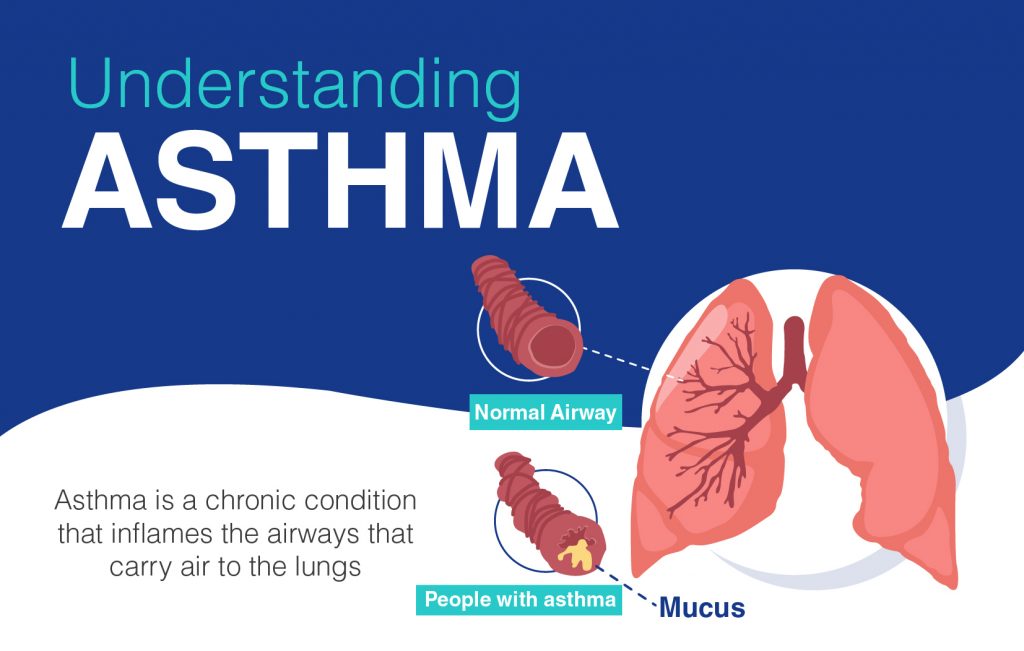 When the airways react, they swell and narrow even more, and also produce extra mucus, all of which make it harder for air to flow to the lungs. The muscles around the airways also tighten, which further restricts airflow.
When the airways react, they swell and narrow even more, and also produce extra mucus, all of which make it harder for air to flow to the lungs. The muscles around the airways also tighten, which further restricts airflow.
Asthma can be life-threatening if proper treatment is delayed.
What are the symptoms of Asthma?
Symptoms of Asthma can include:
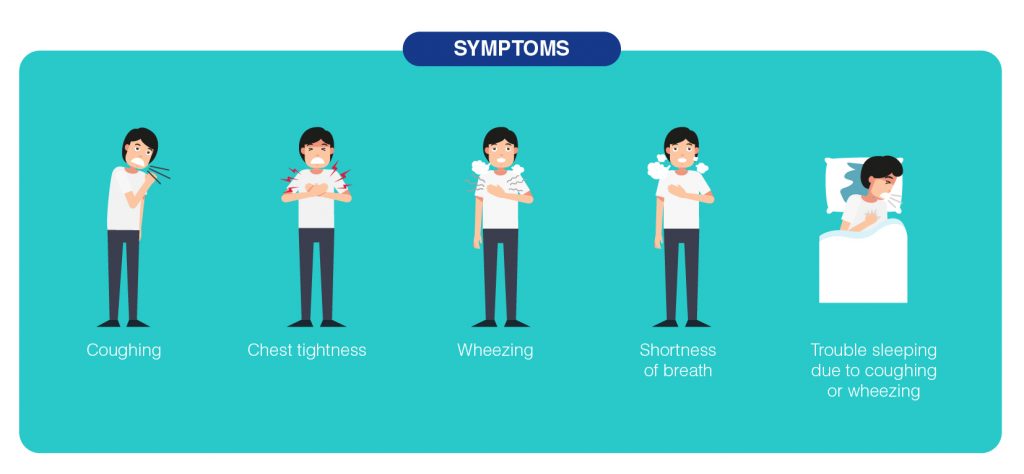
- Coughing
- Chest tightness
- Wheezing, a whistling sound when breathing
- Shortness of breath
- Trouble sleeping due to coughing or wheezing
What is an Asthma attack?
An asthma attack is a sudden worsening of symptoms. With an asthma attack, the airways tighten, swell up, or fill with mucus.
What causes Asthma?
The underlying cause of asthma is not known, but it’s probably due to a combination of genetic and environmental factors.
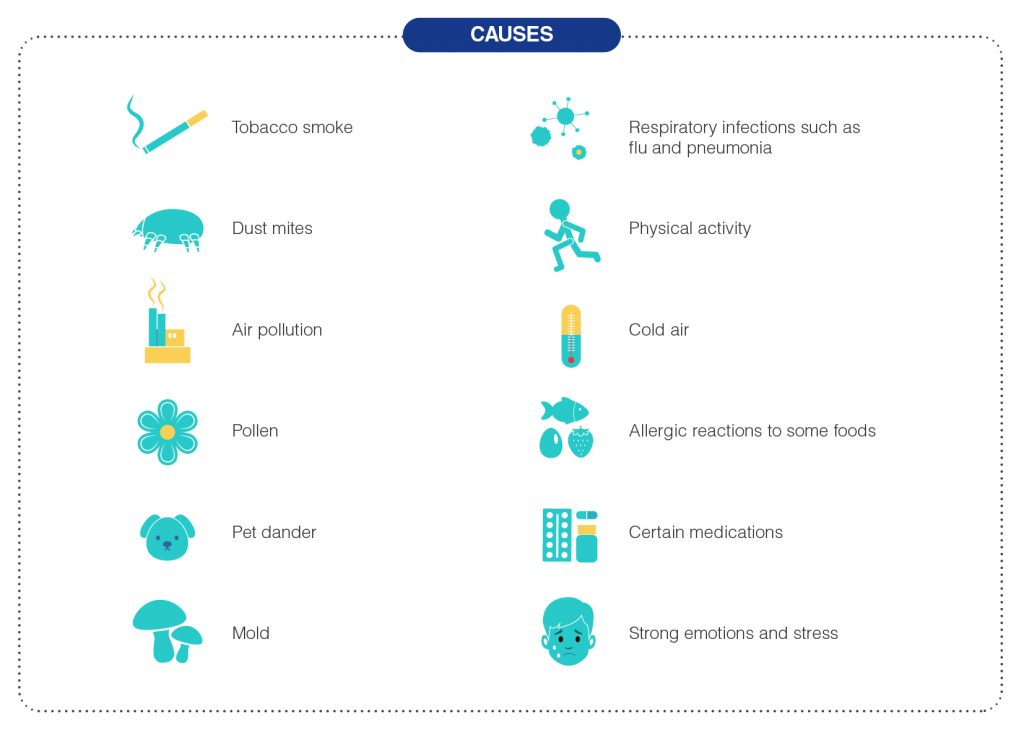
Symptoms of asthma can be caused by triggers. Common asthma triggers include:
- Tobacco smoke
- Dust mites
- Air pollution
- Pollen
- Pet dander
- Mold
- Respiratory infections such as flu and pneumonia
- Physical activity
- Cold air
- Allergic reactions to some foods
- Certain medications
- Strong emotions and stress
- Gastroesophageal reflux disease (GERD), a condition in which stomach acids back up into the throat
How is Asthma classified?
Asthma is classified into four general categories:
- Mild intermittent: Mild symptoms up to two days a week and up to two nights a month
- Mild persistent: Symptoms more than twice a week, but no more than once in a single day
- Moderate persistent: Symptoms once a day and more than one night a week
- Severe persistent: Symptoms throughout the day on most days and frequently at night

What are the types of Asthma?
There are following types of Asthma:
- Adult-onset asthma: Asthma can develop at any age, and adult-onset asthma is a description used for adults who develop asthma.
- Exercise-induced Asthma: This form of asthma is triggered by physical activity.
- Allergic asthma: It is caused by triggers such as dust, pollen, pet dander, food, and mold.
- Nonallergic asthma: It is caused by irritants in the air not related to allergies such as burning wood, cigarette smoke, cold air, air fresheners, perfumes.
- Occupational asthma: It is caused by triggers in the workplace such as dust, dyes, gases and fumes, industrial chemicals, animal proteins, and rubber latex.
- Nocturnal asthma: In this type of Asthma, symptoms get worse at night.
- Asthma-COPD overlap: Chronic obstructive pulmonary disease (COPD) is a collection of lung diseases that cause breathing problems and obstruct airflow. Most people with asthma will not develop COPD, and many people with COPD don’t have asthma. Asthma-COPD overlap syndrome occurs when a person has these two diseases at once.
- Medication asthma: In this type of Asthma, symptoms are triggered by medications.
- Cough-variant asthma: This type of asthma is characterized by a persistent, dry cough
What are the risk factors for Asthma?
A number of factors increase the chances of developing asthma. These include:
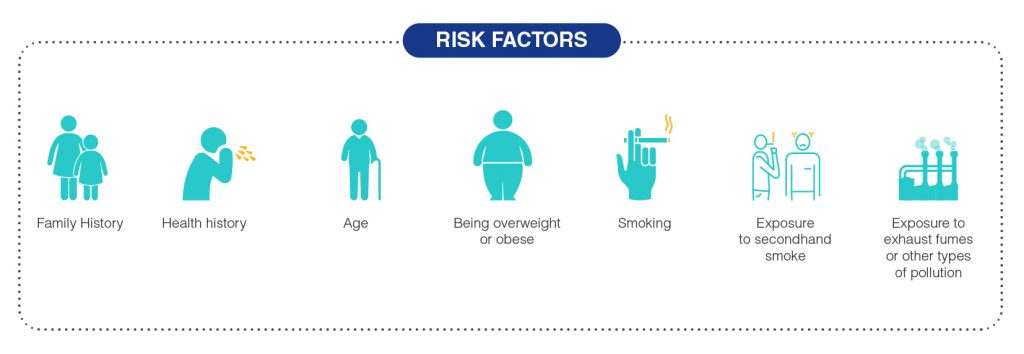
- Family History: Children born to parents with the disease are more likely to develop it.
- Health history: People diagnosed with certain conditions, including allergies and eczema, are more likely to be diagnosed with asthma.
- Age: Asthma can develop in adulthood, but the majority of asthma diagnoses are made during childhood.
- Exposure to occupational triggers, such as chemicals used in farming and manufacturing
- Being overweight or obese
- Smoking
- Exposure to secondhand smoke
- Exposure to exhaust fumes or other types of pollution
How is Asthma treated?
Asthma can’t be cured, but its symptoms can be controlled.
Managing asthma usually involves below:
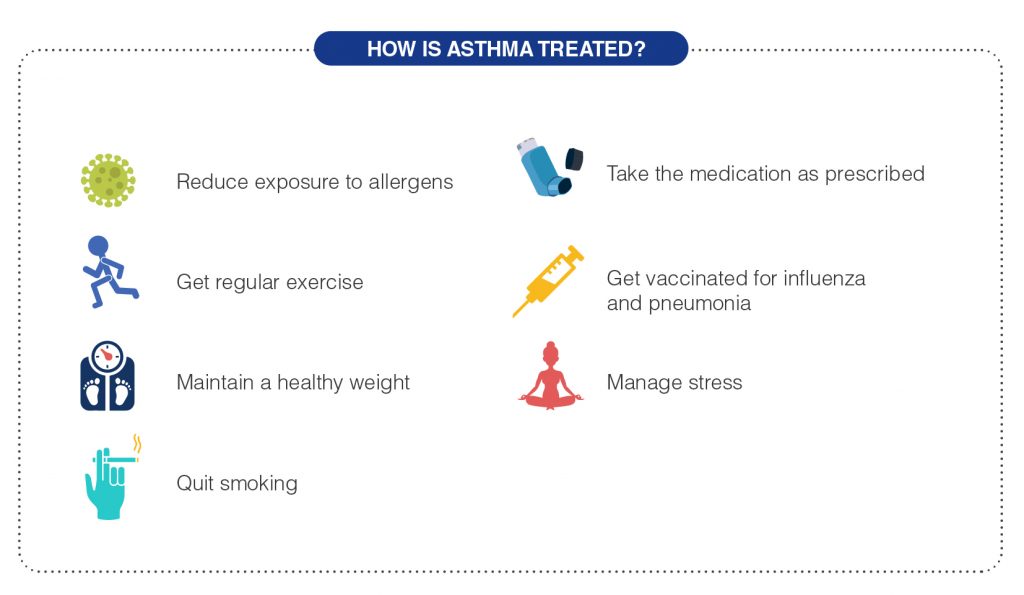
- Identify and avoid asthma triggers
- Reduce exposure to allergens that can trigger an asthma attack
- Get regular exercise. Regular exercise can strengthen the heart and lungs, which helps relieve asthma symptoms.
- Maintain a healthy weight. Being overweight can worsen asthma symptoms, and increases the risk of other health problems.
- Quit smoking.
- Take the medication as prescribed.
- Get vaccinated for influenza and pneumonia
- Manage stress as stress can be a trigger for asthma symptoms.













